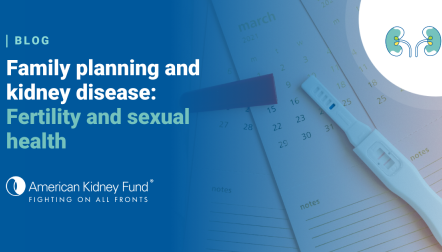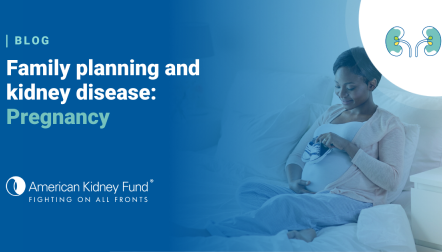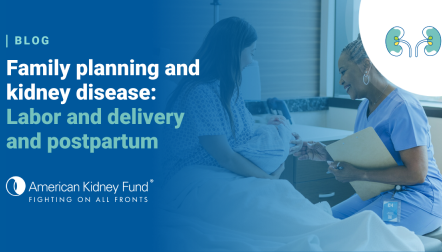
Chronic Kidney Disease (CKD) and Pregnancy
- Medically reviewed by
- Dr. Jessica Tangren
- Last updated
- September 24, 2024
Can I get pregnant if I have CKD?
You can become pregnant if you have chronic kidney disease (CKD). Your stage of CKD will affect your ability to become pregnant, and your risk for certain complications in pregnancy.
When considering pregnancy, the most important factor is timing. You should tell your nephrologist (kidney doctor) about your family planning goals early on and discuss your options. Planning in advance can help ensure a safe pregnancy, for both you and your baby. Even if you do not want to have children soon, let your nephrologist know if you would like to in the future. This will help them understand your goals and values when deciding the best way to treat your kidney disease.
Pregnancy in stages 1 and 2
If you are in the early stages of CKD, and you have a normal blood pressure and low levels of protein in your urine, you are likely to experience a healthy, normal pregnancy.
Having high blood pressure is one of the strongest predictors of giving birth early (before 34 weeks). High blood pressure is also a risk factor for preeclampsia, a condition that happens when blood flow to the placenta is disrupted and the placenta does not develop properly. Pre-eclampsia is a common complication for patients with CKD who are pregnant.
For patients with CKD who are in the early-stage of pregnancy, it is recommended to monitor your blood pressure throughout your pregnancy. You can do this with an at home blood pressure cuff and write down each measurement. Your health care provider will follow your blood pressure, test your urine for protein and monitor your BUN and creatine levels throughout pregnancy, to assess how well your kidneys are working.
Pregnancy in stages 3 and 4
As your glomerular filtration rate (GFR) declines, so does fertility. If you are in the later stages of CKD, you are more likely to experience issues with becoming pregnant and with carrying your pregnancy for the full nine months, which is sometimes called carrying to term.
Pregnancy in the later stages of CKD comes with an increased risk of preeclampsia, especially if you have high blood pressure and high levels of protein in your urine.
There is also a higher risk for decline in kidney function during pregnancy. Pregnancy can put stress on the kidneys. For those with kidney disease, this can cause you to lose kidney function. Some women with advanced kidney disease may need to start dialysis as a result of pregnancy.
Pregnancy in end-stage kidney disease (ESRD)
Improvements in dialysis delivery have improved pregnancy outcomes with ESRD on dialysis. However, pregnant dialysis patients still face many risks and complications.
Patients on hemodialysis have fewer complications getting pregnant and carrying to term than patients on peritoneal dialysis. Talk to your doctor about the best dialysis option for you.
If you are on hemodialysis, you can expect changes to your dialysis regimen. This will include an increase in the time spent on dialysis, which can be achieved by doing hemodialysis at home or overnight. Many pregnant patients on dialysis need 24-36 hours of dialysis per week. Changes to your nutrition plan may be made to increase the amount of vitamins and minerals you consume, which are vital to the growth of a healthy baby. You will also need to make sure you are getting enough protein.
As your pregnancy progresses, you will have increased monitoring and surveillance, including assessing the growth of the baby, and the amount of fluid (called amniotic fluid) surrounding the baby. Blood pressure will also be monitored, to watch for preeclampsia.
When it comes time to give birth to the baby, it is recommended to give birth in a hospital with access to neonatal intensive care (NICU) facilities, as rates of early birth are common. This is a part of the hospital that has special equipment, doctors, and nurses that take care of newborn babies who need extra monitoring.
Pregnant dialysis patients can give birth either vaginally or via cesarean section.
Pregnancy in transplant
Pregnancies after transplant have high rates of live births, like pregnancies in people without CKD.
The most important consideration for kidney transplant recipients is waiting 1 to 2 years before becoming pregnant. Some medicines given after transplant to prevent rejection (immunosuppressants) can be harmful to babies (teratogenic). It is important to talk to your doctor about these medicines and make any necessary changes before becoming pregnant.
Will having CKD affect a baby?
CKD can be a risk factor for poor outcomes in babies. They may be born early (before 37 weeks gestational age) or smaller than is expected (growth restriction). Babies born to women with CKD are also admitted to the neonatal intensive care unit more often.
If you have a genetic kidney disease, you can work with your doctor and a genetic counselor to understand what the risk is to your baby. Some women with genetic kidney disease will decide to use IVF (in vitro fertilization) to prevent passing genetic conditions on to their children. IVF is a process where eggs are surgically removed from the ovaries and fertilized with sperm in a lab. The fertilized eggs, also called embryos, are placed into your uterus where they can implant, resulting in pregnancy.
There is no increased risk for congenital abnormalities for babies born to women with CKD, however there are health concerns associated with a baby being born prematurely (early). These can include:
- Breathing problems
- Heart problems
- Issues with regulating their body temperature
- Weakened immune systems
Will CKD affect my post-partum experience?
After giving birth, you enter what is known as the post-partum period. During this time, you and your baby are both adjusting and recovering from birth.
Women with CKD can experience a normal post-partum period, but experiences vary widely depending on your stage of CKD, the medicines you may be taking, and other factors. It may be possible for you to breast feed; however, it is important to talk to your nephrologist and OB-GYN. Some changes to your medicines may need to be made, and your providers can help you understand what to expect during this time.
Pregnancy and post-partum are different for everyone, communicating with your care providers regularly can help both you and your baby as you adjust.
Who should I have on my care team when I am pregnant?
Pregnancy is a unique health condition, there are two patients to take care of. Care is needed for both the mother and the baby, and your care team will need to expand to include providers for both patients.
Some providers on your care team may include:
- Nephrologist – a doctor that takes care of your kidneys
- OB/GYN - a doctor that takes care of women's reproductive systems and the unborn baby
- Neonatologist – a doctor that takes care of babies who are sick or born early
- Midwife – a healthcare professional that takes care of women before, during, and after giving birth
Throughout the pregnancy experience, you can always talk with your providers about any concerns or worries that you have. If you do not feel listened to or respected by your providers, you can seek care from other providers.
Can pregnancy make my kidney disease worse?
Yes. During pregnancy, the amount of blood being filtered by the kidneys increases, which puts additional stress on the kidneys. This can put more stress on the kidneys and worsen kidney disease.
Can pregnancy hurt my kidney transplant?
Many women with kidney transplants do not experience complications with their kidney, but it can happen. Talk to your nephrologist about ways to monitor your kidney transplant throughout pregnancy and any medicine changes that should be made.
Is it possible to start dialysis if I'm already pregnant?
Yes. It is possible, and in some cases, beneficial to start dialysis during pregnancy. Your doctors will monitor your kidney function during pregnancy and may recommend starting dialysis if your kidneys are not working like they should.




